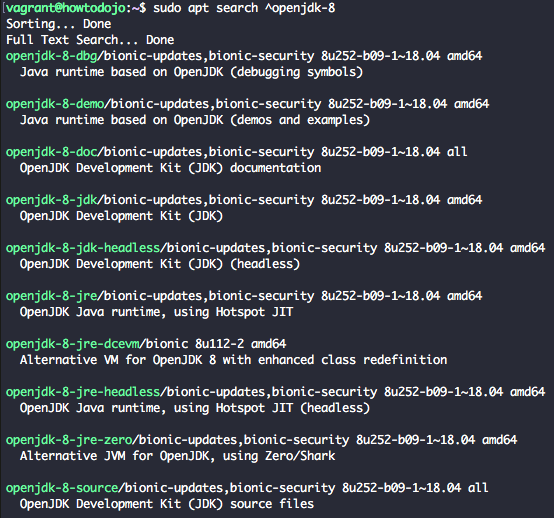

- #PACKAGE OPENJDK 7 JRE HAS NO INSTALLATION CANDIDATE HOW TO#
- #PACKAGE OPENJDK 7 JRE HAS NO INSTALLATION CANDIDATE INSTALL#
- #PACKAGE OPENJDK 7 JRE HAS NO INSTALLATION CANDIDATE UPDATE#
- #PACKAGE OPENJDK 7 JRE HAS NO INSTALLATION CANDIDATE ANDROID#
- #PACKAGE OPENJDK 7 JRE HAS NO INSTALLATION CANDIDATE SOFTWARE#
You can have multiple Java installations on one server.
#PACKAGE OPENJDK 7 JRE HAS NO INSTALLATION CANDIDATE HOW TO#
Now let’s look at how to select which version of Java you want to use. Accept the agreement and the JDK will install. Your system will download the JDK from Oracle and ask you to accept the license agreement.
#PACKAGE OPENJDK 7 JRE HAS NO INSTALLATION CANDIDATE INSTALL#
sudo apt install oracle-java10-installer. Once the package list updates, install Java 10: Gpg: key EA8CACC073C3DB2A: public key "Launchpad PPA for Linux Uprising" importedĮxecute this command to import the necessary key: sudo apt-key adv -keyserver -recv-keys EA8CACC073C3DB2A Gpg: /tmp/tmpvuqsh9ui/trustdb.gpg: trustdb created Outputgpg: keybox '/tmp/tmpvuqsh9ui/pubring.gpg' created It will attempt to import some GPG signing keys, but it won’t be able to find any valid ones: Press to continue or ctrl-c to cancel adding it More info (and Ubuntu installation instructions):įor Oracle Java 10, see a different PPA: Update: Oracle Java 9 has reached end of life: Important -> Why Oracle Java 7 And 6 Installers No Longer Work: There are no actual Java files in this PPA. Output Oracle Java (JDK) Installer (automatically downloads and installs Oracle JDK8). If Java is not currently installed, you’ll see the following output: Next, check if Java is already installed: #PACKAGE OPENJDK 7 JRE HAS NO INSTALLATION CANDIDATE UPDATE#
To install this version, first update the package index: Java 8 is the current Long Term Support version and is still widely supported, though public maintenance ends in January 2019. This package will install OpenJDK version 1.8, which is compatible with Java 8. By default, Debian 9 includes Open JDK, which is an open-source variant of the JRE and JDK. The easiest option for installing Java is to use the version packaged with Debian.
One Debian 9 server set up by following the the Debian 9 initial server setup guide tutorial, including a non-root user with sudo access and a firewall. #PACKAGE OPENJDK 7 JRE HAS NO INSTALLATION CANDIDATE SOFTWARE#
When you’re finished, you’ll be able to use the JDK to develop software or use the Java Runtime to run software. You’ll then select the version you wish to use for your projects. You’ll install OpenJDK as well as official packages from Oracle. In this guide, you will install various versions of the Java Runtime Environment (JRE) and the Java Developer Kit (JDK) using apt.
ImportError: libcudnn.so.Java and the JVM (Java’s virtual machine) are required for many kinds of software, including Tomcat, Jetty, Glassfish, Cassandra and Jenkins. #PACKAGE OPENJDK 7 JRE HAS NO INSTALLATION CANDIDATE ANDROID#
Android 8.1 compilation error Jack server problem. Ngnix+gunicorn+Flag project deployment in Ubuntu. Error: could not find java.dll Error: could not find Java se runtime environment solution. Datagrip import & export table structure and data. Solutions to the failure of importing Python 3.7 SSL module. Configure Java environment variables for Ubuntu with Zsh configuration. The python version output from the command line is inconsistent with the python version in the current CONDA environment. unrecognized relocation (0x2a) in section `.text`. Solve the problem of prompt couldn’t find path to unrear library after installing unrear in Python. ExecutableNotFound: failed to execute, make sure the Graphviz executables are on yo. About LCM spy running error in LCM v1.4.0. The Java command could not find or load the main class. You need to re export the environment variable through the following command: export PATH=/bin:/usr/bin:/usr/local/bin The reason mentioned on the Internet is due to the modification of the path environment variable. When executing the source command, the prompt "command not found" is also dizzy. If the version information is displayed successfully, the environment is installed successfully (you may need to restart the system here) sudo source /etc/profile Enter the following command to make it work. The command is as follows: sudo gedit /etc/profileĪdd the following lines at the end of the file: export JAVA_HOME=~/jre Then, set the environment variables by modifying the /etc/profile file. Unzip the downloaded file, I put it directly under the home directory, and change the unzipped folder name to JRE, which is ~/JRE. 
In fact, you can directly download the tar.gz package corresponding to JRE from Oracle’s Java official website. This problem should be caused by the current data source does not contain JRE, but it is also troublesome to find an available data source to add.






 0 kommentar(er)
0 kommentar(er)
